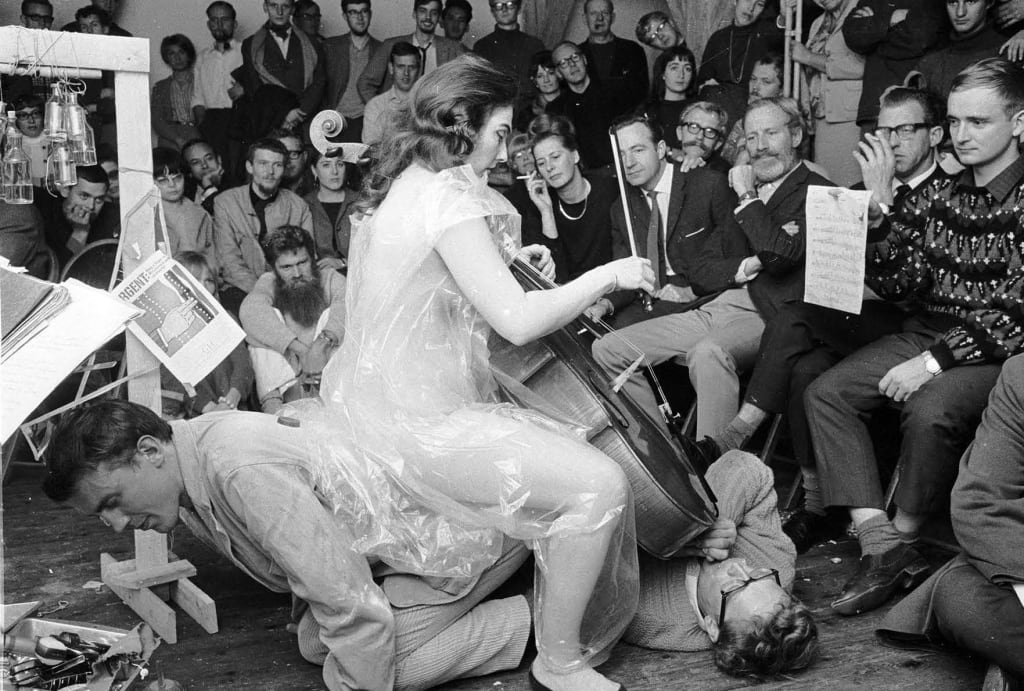Great Art Made Impossible By Superficial Entertainments
Why we have no Mozart, and no Debussy.

Charlotte Moorman, naked, wrapped in plastic, performing a concert in 1966. People went to such Classical music concerts back then, and considered it fun and worthwhile. Now, not so much. We are over-saturated with flashy entertainment on our digital devices. (I really wanna be the guy holding the cello end-pin in my teeth! That looks like fun!!)
I think about fads within the art form we call, Classical Music. Many of the hot, trendy living composers of the 1960s and 1970s are nearly forgotten in the United States, known only among music geeks, and rarely performed. Even our most famous Classical composers, the Hollywood film composers, are rarely programmed by major symphony orchestras. When they do get programmed, it is collections of their film music, rather than pieces specifically composed as concert pieces, like a Symphony or a Violin Concerto. The fact is, the paying audience, the Symphony Board, and the major benefactors of most professional symphony orchestras, want to hear Brahms, Mozart, Beethoven and the other truly great, but thoroughly dead composers. They will put up with a short overture by some living composer, but that is usually as far as the audience will stretch its patience.
Given these circumstances, we have four categories of 21st Century classical music composers: 1.) The Hollywood composers, 2.) Academic composers -with some sort of reputation- with tenured university jobs. 3.) A small group of composers -with some sort of reputation- who are funded by one or two wealthy benefactors, and 4.) Talented and serious classical composers, who no one is ever likely to hear. All of this flies under the radar of most music lovers. As I said, as consumers of entertainment in the 21st Century United States, we are over-saturated, and hardly notice classical music at all. It struggles to remain a living, breathing and worthwhile art form. For the most part, audience time and money is spend elsewhere, on flashier things, usually visual art forms, film and video productions. The audio art form, Classical music, with its limited visual appeal, feels sort of old fashioned. Rock and pop music are often as much theater as they are music, so they fall into the entertainment category of video or theater, rather more than being exclusively music.
Given these circumstances, it is nearly impossible for a talented, living Classical composer to gain any following, nor any financial support. This is the main reason we have not had a Beethoven nor a Mozart, nor Sibelius in the United States, and more broadly, on the entire planet for over 100 years. There needs to be a paying audience, to consume the art of the great artists. Great artists are being born, and they produce some art, but more often than not, they go unnoticed and unsupported by the civilization in which they live. Especially in the United States. Does anyone care enough about the art form called, Classical music, to do anything about this situation? Probably not. Again, we are an entertainment economy driven by flash and visual stimulation, not by the high artistic standards of a Beethoven, a Brahms, a Debussy, a Dvorak, a Nielsen or a Sibelius.
I point our this flaw in our civilization, because the situation does not only apply to composers. We can include, painters, poets, novelists, dancers, sculptors, and even scientists, inventors and innovative holistic doctors. Few people in these categories succeed, without serious money behind them, seriously good marketing plans, and opportunities to bring their art to large audiences. A scientist or an inventor working in an area of discovery which has no cachet among wealthy decision-makers, is lucky to even get a job at a small community college. Both the inventors and the innovative doctors also have another hurdle: Technology and medicine are huge businesses, and squash any competition. So when an inventor or a doctor comes up with something truly brilliant, the big guys want to own it, or those ideas may be suppressed, publicly denigrated, or worse, taken to court in the form of lawsuits, to permanently disable or destroy the lives of the inventor or the doctor. Thank God this does not happen to most musicians and artists!
About the Creator
Roscoe Forthright
Erotic filmmaker and novelist. I use x-rated heterosexual short films as a tool for spiritual enlightenment. Laugh all you want. This actually works for many people. Fucking is universal! And very popular!






Comments
There are no comments for this story
Be the first to respond and start the conversation.